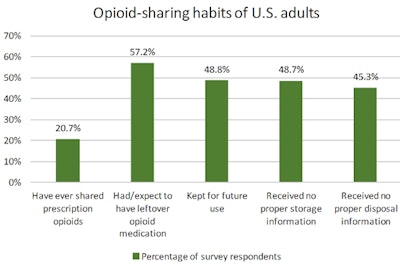
One out of five adults has shared prescribed opioid medication with another person, according to a new study in JAMA Internal Medicine. Many study participants also didn't receive safe storage information from their provider or pharmacist.
Researchers from the John Hopkins Bloomberg School of Public Health conducted a national survey to find out how often U.S. adults share their opioid medication. The findings, published as a research letter, were dismal (JAMA IM, June 13, 2016).
"The fact that people are sharing their leftover prescription painkillers at such high rates is a big concern," stated Colleen Barry, PhD, one of the study researchers, in a press release. "It's fine to give a friend a Tylenol if they're having pain, but it's not fine to give your OxyContin to someone without a prescription."
“The fact that people are sharing their leftover prescription painkillers at such high rates is a big concern.”
Common to share opioids
Many adults and adolescents who abuse or misuse prescription opioids get the medications from friends and family, and 90% of adults with substance abuse disorders started using drugs and alcohol before they turned 18. Nevertheless, the extent to which U.S. adults readily share leftover prescriptions with others has not been frequently studied.
Lead author Alene Kennedy-Hendricks, PhD, and colleagues used survey company GfK to ask adults about their opioid medication storage, sharing, and disposal habits. The survey included 1,032 adults who had been prescribed opioids within the past year, and the researchers oversampled from households with at least one child.
In an email to DrBicuspid.com, Kennedy-Hendricks noted that they did not specifically ask participants what type of provider prescribed the medication. However, a 2011 Journal of the American Medical Association study found that about 8% of prescriptions come from dentists.
"This survey included adults who used a prescription opioid in the past year, regardless of what type of provider prescribed the opioid medication," she wrote in the email. "Our study sample certainly could have included individuals who were prescribed opioid medications by dentists and/or oral-maxillofacial surgeons; however, I can't tell you the proportion of our sample for which this was the case."
The survey found that 20.7% of adults have shared opioid medication with another person, most often to help the other person manage pain. Adults also shared medication because the other person could not afford opioid medication or did not have insurance.

Furthermore, more than half of participants had or expected to have leftover opioids, and nearly half of adults didn't receive information about safe storage and proper medication disposal.
Extra-opioid problem?
One limitation of the study was that it included self-reported data, which "may be subject to social desirability bias," according to the authors. They also attempted to create a survey panel that represented all U.S. adults, but they cannot guarantee that the respondents were entirely representative.
Nevertheless, the findings are concerning, especially in light of a 2015 study that showed similar problems for children prescribed opioids. That study found that kids used, on average, less than half of their prescribed opioid medication, and 82% of parents were not told what to do with leftover medication.
Kennedy-Hendricks and colleagues recommended that future studies evaluate the U.S. Centers for Disease Control and Prevention (CDC) prescribing guidelines, as well as the recent decision by the U.S. Food and Drug Administration (FDA) to add a black box warning to the medication.
"More research is needed to identify effective strategies to advance safer practices related to opioid medication sharing, storage, and disposal," they concluded. "In the meantime, reducing the prescribing on large quantities of opioid medications and disseminating clear recommendations on safe storage and disposal of opioid medications widely to the public and prescribers may reduce risk."



















